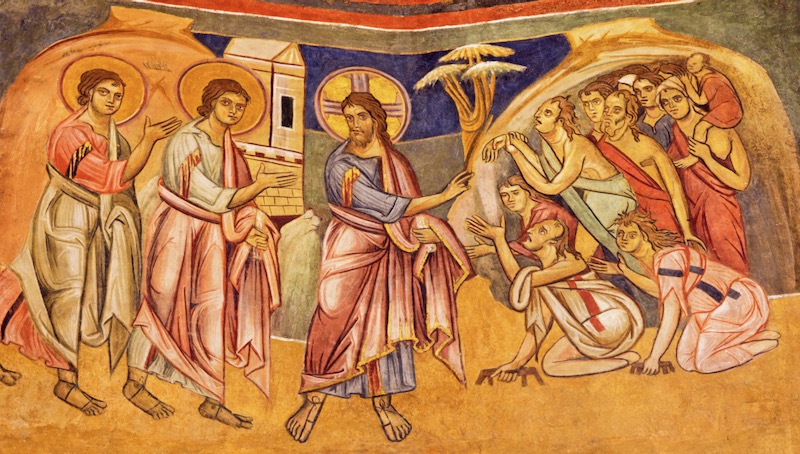This passage in Luke’s gospel, about one overwhelmingly grateful, healed leper and nine ingrates, has a universal resonance such that, whether you’re from Beijing, Boston or Basingstoke, in the 1st or 21st century, you can’t but empathise with Jesus’s palpable dismay, when he asks: “The other nine: where are they?” What makes this episode so timeless is the profound significance that we instinctively attach to gratitude: and, conversely, the universal opprobrium that attaches to its opposite.
Gratitude, of course, has many counterfeits, but the genuine article is worlds apart from either social ‘smoothery’ or self-interested charm. Genuine gratitude is, as it were, written into our DNA, into the ‘depth-grammar’ of our nature. It is almost a self-evident good, needing no support from argument, a quality of soul, a virtue, in the classical sense of a disposition that inclines us to act for the good naturally, with ease and even with pleasure.
Gratitude and its opposite crucially define our character and decisively determine our outlook on everything, especially ourselves and our lives, marking a far more deeply definitive difference than any other distinction. Total, ingrained ingratitude is more a pathological condition than a moral failing.
But gratitude is much more than an individual attribute: like courtesy and kindness, and generosity and compassion, gratitude is an indispensable condition of civilised existence. A world without gratitude would be a terrifying, brutish, dangerous place. A world where ingratitude was valued over gratitude would be the nearest thing to a definition of Hell. 2
No wonder that ingratitude cuts more deeply and more painfully and is more shocking than almost anything else: hence Lear’s lament: “How sharper than a serpent’s tooth it is, to have a thankless child.”1 The whole of King Lear could be read as a meditation on the catastrophic social and political impact of ingratitude and how only gratitude counters the negative and ultimately destructive effects of resentment, the most destructive and demoralising of all human emotions, and regret, the most negative.
But gratitude figures in our lives so deeply because in every particular expression of gratitude, we give implicit expression to our sense of the given-ness of existence itself, no less real for being so difficult to articulate. And that gratitude for the given-ness of everything which lurks in the metaphysical undergrowth of every particular ‘thank-you’, concerns – to steal a line from Wittgenstein – not how things are but that they are.2 And, by extension, not how we are, but that we are.
To see life as a gift, something that need not have been, is to see it, implicitly, as purposefully brought into and sustained in existence – created, in other words - as opposed to being the result of a random concatenation of meaningless events. A world whose existence is not an a priori necessity is a world for which, despite its shadow-side, it is impossible not to give thanks.
And if to feel, almost as a default setting, an overwhelming sense of gratitude, is to affirm implicitly the gift of existence itself, it also implies the existence of a Giver. The Polish poet, Czeslaw Milosz (1911-2004), catches the same intimation when he says of someone in a similar position to the grateful leper that “He felt gratitude: so, he couldn’t not believe in God.”3 3
That’s why gratitude is so closely allied to reverence and respect, wonder and awe. It is a prime candidate for what an American sociologist of religion in the 1970s, called “a signal of transcendence”, an aspect of ordinary life which, even if we find it near impossible to say how or why, constitutes a source of meaning and value, written into and read off from our everyday experience of the world, but pointing beyond: an inkling of something more.
All of this is present in this particular gospel where, as always, everything is more than it seems; and this is why Jesus gives such extraordinary weight to the grateful response of the Samaritan leper. His gratitude is an expression of faith, even if unacknowledged, the more remarkable, because the detested Samaritan would have been, from a Jewish point of view, the least likely person to exemplify faith. But, Jesus says, it is precisely his faith that has healed him.
Faith and gratitude, then, if not exactly interchangeable, are certainly correlative, in that both see and savour the miracle and mystery of being, finding it impossible either to take it for granted or to be anything less than awed. Faith, in its essence, sees through ‘giftedness’ to a Giver.
But there’s even more. The leper’s (and our) gratitude isn’t just for the gift of existence. His gratitude, as with all gratitude, is for the infinitely precious gift of being loved. Why else do we give one another gifts, if not to give outward and concrete expression to our love for one another? Gifts, when genuinely given, are always but pale tokens of our very selves.
So love, the impenetrable, personal mystery at the heart of human existence, is the ‘signal of transcendence’, par excellence. Indeed, Christianity stakes everything on identifying God as the source and ultimate object of all genuine love, wherever and however, it’s found. Ubi caritas et amor, Deus ibi est.
A good case could be made for saying that gratitude, along with so much else we take for granted but whose origins and roots we’ve collectively forgotten, is integral, not to our human nature, as such, but to human nature shaped and schooled by Christian sensibility: something latent, to be sure, in our nature, which Christianity has now made patent, to borrow again from Wittgenstein.
Until Christianity, gratitude wasn’t prized in anything like the same way. Aristotle, for instance, thought it was demeaning, that it rendered us inferior. Cicero thought the purpose of gratitude, as well as the exchanging gifts, served only the purpose of furthering one’s career. And, with his sense of Stoical self-sufficiency to the fore, Seneca felt that, since you must never be in anybody’s debt, you should equal, if not exceed, the gift given by a greater gift in return.
It is only with Christianity that gratitude comes to occupy such a central and self-evident part of the good life. No surprise, then, that the ancient Greek name for the Mass – eucharist – means ‘gratitude’, the Mass being the supreme act of thanksgiving to God. That’s no semantical happenstance: it touches the very essence of what it is to be created and sums up entirely the Good News that is the Gospel.
The source and object of all gratitude, whether acknowledged or not, is God, the ultimate cause and goal of existence and the ultimate source and goal of love, however and whenever we genuinely experience it. God is Love Itself, Goodness Itself, and Being Itself; and we heard last week, “it is because we are loved that we exist.” How fitting, then, that the very last words of the Mass should be: “Thanks be to God”.
6



 Loading ...
Loading ...
What do you think?
You can post as a subscriber user ...
User comments (0)